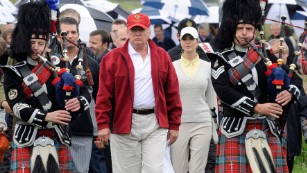Donald Trump debate: Could UK really ban him?
Donald Trump was in the spotlight Monday in Britain's Parliament, where lawmakers debated whether the Republican presidential front-runner should be barred from entering the country. The suggestion follows Trump's call to ban Muslims from entering the United States.
Read: British MPs to debate banning Trump from UK for 'hate speech'
It's an unusual spectacle with unknown ramifications for the billionaire businessman's political prospects back in the United States. But here are a few questions we can answer:
Has the UK ever held such a debate before?
Questions have certainly been raised in Parliament before about banning people from the UK, but a whole debate about one particular person is unprecedented in living memory.
Parliamentary power, however, isn't required to impose the "persona non grata" label. Home Secretary Theresa May can ban anyone who's been convicted of a crime and sent to prison or has broken immigration rules. If they are coming from outside the European Economic Area (the EU plus Iceland, Liechtenstein and Norway), she can ban them if she considers their presence in the UK to be nonconducive to the public good.
In 2011, the U.S. pastor Terry Jones, who planned a Quran-burning protest, was barred on those grounds. Others who have been barred include Hamas MP Yunis Al-Astal, Jewish extremist Mike Guzovsky and ex-Ku Klux Klan Grand Wizard Stephen "Don" Black.
Tulip Siddiq, a member of Parliament, seemed to be following those lines during the debate, calling Trump a "poisonous, corrosive man."
"His words are not comical, his words are not funny, his words are poisonous, they risk inflaming tension between vulnerable communities," she said.
Why is this debate happening? Will it matter?
A petition to ban Trump was started by Suzanne Kelly, a freelance journalist in Aberdeen, Scotland, where Trump owns a nearby golf course and is a divisive figure. She was angry over Trump's call to ban Muslims from entering the United States.Kelly's petition clearly hit a nerve, as it quickly gained enough signatures to be put forward as a topic of debate in Parliament. As of Monday, more than 575,000 people had signed it.

Trump faces backlash in Scotland over Muslim comments
The debate is nonbinding, though. No vote of any kind will be held, so there will be no substantive result. In fact, opposition lawmaker Paul Flynn, who's leading the debate, thinks a ban could be counterproductive, as it could make Trump seem unfairly victimized and boost him in the eyes of Americans.
In the end, it will probably be more of an opportunity for politicians to vent their thoughts about Trump under the protection of parliamentary privilege, which allows them to say what they want without being accused of defamation or slander.
What has the government said about Trump?
There's no sign the home secretary will ban Trump, but that doesn't mean she agrees with him. She has said his remarks in relation to Muslims are divisive, unhelpful and wrong, but the government has also said that exclusion powers are very serious and are not to be used lightly.
Prime Minister David Cameron doesn't support the ban, even though he called Trump's proposal to keep Muslims out of the United States "divisive, stupid and wrong." For good measure, he added, "If he came to visit our country, I think he would unite us all against him."
Does the debate reflect British public opinion on Trump?
There hasn't been any significant polling, though two online surveys in December showed between 25% and 30% of Brits agreed with Trump's proposal to halt all Muslim immigration. Those defending Trump are certainly in the minority whenever there's a debate in the media. He's often not taken seriously in Britain, especially when Trump claimed that parts of London were so radicalized, police were in fear of their lives.
However, this may change the longer he stays in the race.
What do those who signed the petition hope it will achieve?
Many people do hope it will lead to a ban, even though the debate in itself can't make that happen. May said last month she would not comment on calls to ban Trump, adding: "The decision on whether to ban anyone from the UK is made by the home secretary on the basis of the evidence at the time."
It's unlikely that Trump will be banned, all things staying the same, but the debate will be an interesting expression of how politicians in one allied country feel about the prospect of a President Donald Trump.
What has Trump said about the debate?
Trump has warned that he would end all current and future investments in the United Kingdom if he's banned from entering the country.
In a statement, his Trump Organization said: "Westminster would create a dangerous precedent and send a terrible message to the world that the United Kingdom opposes free speech and has no interest in attracting inward investment.
"This would also alienate the many millions of United States citizens who wholeheartedly support Mr Trump and have made him the forerunner by far in the 2016 presidential election.
"Many people now agree with Mr. Trump that there is a serious problem that must be resolved. This can only be achieved if we are willing discuss these tough issues openly and honestly."
News Courtesy: www.cnn.com











